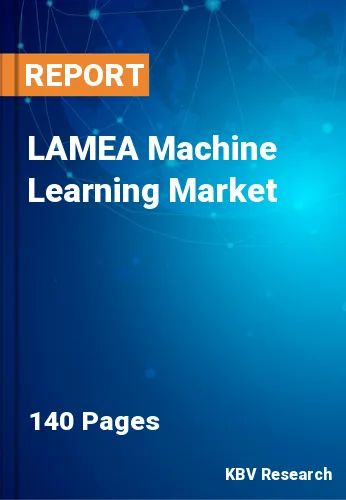Chapter 1. Market Scope & Methodology
1.1 Market Definition
1.2 Objectives
1.3 Market Scope
1.4 Segmentation
1.4.1 LAMEA Machine Learning Market, by Enterprise Size
1.4.2 LAMEA Machine Learning Market, by Component
1.4.3 LAMEA Machine Learning Market, by End-use
1.4.4 LAMEA Machine Learning Market, by Country
1.5 Methodology for the research
Chapter 2. Market at a Glance
2.1 Key Highlights
Chapter 3. Market Overview
3.1 Introduction
3.1.1 Overview
3.1.1.1 Market Composition and Scenario
3.2 Key Factors Impacting the Market
3.2.1 Market Drivers
3.2.2 Market Restraints
Chapter 4. Competition Analysis - Global
4.1 KBV Cardinal Matrix
4.2 Recent Industry Wide Strategic Developments
4.2.1 Partnerships, Collaborations and Agreements
4.2.2 Product Launches and Product Expansions
4.2.3 Acquisition and Mergers
4.3 Market Share Analysis, 2021
4.4 Top Winning Strategies
4.4.1 Key Leading Strategies: Percentage Distribution (2019-2023)
4.4.2 Key Strategic Move: (Partnerships, Collaborations & Agreements: 2019, Feb – 2023, Jun) Leading Players
4.5 Porter’s Five Forces Analysis
Chapter 5. LAMEA Machine Learning Market by Enterprise Size
5.1 LAMEA Large Enterprises Market by Country
5.2 LAMEA SMEs Market by Country
Chapter 6. LAMEA Machine Learning Market by Component
6.1 LAMEA Services Market by Country
6.2 LAMEA Software Market by Country
6.3 LAMEA Hardware Market by Country
Chapter 7. LAMEA Machine Learning Market by End-use
7.1 LAMEA Advertising & Media Market by Country
7.2 LAMEA BFSI Market by Country
7.3 LAMEA Automotive & Transportation Market by Country
7.4 LAMEA Manufacturing Market by Country
7.5 LAMEA Agriculture Market by Country
7.6 LAMEA Retail Market by Country
7.7 LAMEA Healthcare Market by Country
7.8 LAMEA Others Market by Country
Chapter 8. LAMEA Machine Learning Market by Country
8.1 Brazil Machine Learning Market
8.1.1 Brazil Machine Learning Market by Enterprise Size
8.1.2 Brazil Machine Learning Market by Component
8.1.3 Brazil Machine Learning Market by End-use
8.2 Argentina Machine Learning Market
8.2.1 Argentina Machine Learning Market by Enterprise Size
8.2.2 Argentina Machine Learning Market by Component
8.2.3 Argentina Machine Learning Market by End-use
8.3 UAE Machine Learning Market
8.3.1 UAE Machine Learning Market by Enterprise Size
8.3.2 UAE Machine Learning Market by Component
8.3.3 UAE Machine Learning Market by End-use
8.4 Saudi Arabia Machine Learning Market
8.4.1 Saudi Arabia Machine Learning Market by Enterprise Size
8.4.2 Saudi Arabia Machine Learning Market by Component
8.4.3 Saudi Arabia Machine Learning Market by End-use
8.5 South Africa Machine Learning Market
8.5.1 South Africa Machine Learning Market by Enterprise Size
8.5.2 South Africa Machine Learning Market by Component
8.5.3 South Africa Machine Learning Market by End-use
8.6 Nigeria Machine Learning Market
8.6.1 Nigeria Machine Learning Market by Enterprise Size
8.6.2 Nigeria Machine Learning Market by Component
8.6.3 Nigeria Machine Learning Market by End-use
8.7 Rest of LAMEA Machine Learning Market
8.7.1 Rest of LAMEA Machine Learning Market by Enterprise Size
8.7.2 Rest of LAMEA Machine Learning Market by Component
8.7.3 Rest of LAMEA Machine Learning Market by End-use
Chapter 9. Company Profiles
9.1 Amazon Web Services, Inc. (Amazon.com, Inc.)
9.1.1 Company Overview
9.1.2 Financial Analysis
9.1.3 Segmental Analysis
9.1.4 Recent strategies and developments:
9.1.4.1 Partnerships, Collaborations, and Agreements:
9.1.5 SWOT Analysis
9.2 Baidu, Inc.
9.2.1 Company Overview
9.2.2 Financial Analysis
9.2.3 Segmental Analysis
9.2.4 Research & Development Expenses
9.2.5 Recent Strategies and Developments:
9.2.5.1 Partnerships, Collaborations and Agreements:
9.2.6 SWOT Analysis
9.3 Google LLC (Alphabet Inc.)
9.3.1 Company Overview
9.3.2 Financial Analysis
9.3.3 Segmental and Regional Analysis
9.3.4 Research & Development Expense
9.3.5 Recent strategies and developments:
9.3.5.1 Partnerships, Collaborations, and Agreements:
9.3.5.2 Product Launches and Product Expansions:
9.3.6 SWOT Analysis
9.4 H2O.ai, Inc.
9.4.1 Company Overview
9.4.2 Recent strategies and developments:
9.4.2.1 Partnerships, Collaborations, and Agreements:
9.4.2.2 Product Launches and Product Expansions:
9.4.3 SWOT Analysis
9.5 Hewlett Packard Enterprise Company (HP Development Company L.P.)
9.5.1 Company Overview
9.5.2 Financial Analysis
9.5.3 Segmental and Regional Analysis
9.5.4 Research & Development Expense
9.5.5 Recent strategies and developments:
9.5.5.1 Partnerships, Collaborations, and Agreements:
9.5.5.2 Acquisition and Mergers:
9.5.6 SWOT Analysis
9.6 Intel Corporation
9.6.1 Company Overview
9.6.2 Financial Analysis
9.6.3 Segmental and Regional Analysis
9.6.4 Research & Development Expenses
9.6.5 Recent strategies and developments:
9.6.5.1 Partnerships, Collaborations, and Agreements:
9.6.5.2 Product Launches and Product Expansions:
9.6.6 SWOT Analysis
9.7 IBM Corporation
9.7.1 Company Overview
9.7.2 Financial Analysis
9.7.3 Regional & Segmental Analysis
9.7.4 Research & Development Expenses
9.7.5 Recent strategies and developments:
9.7.5.1 Partnerships, Collaborations, and Agreements:
9.7.5.2 Product Launches and Product Expansions:
9.7.6 SWOT Analysis
9.8 Microsoft Corporation
9.8.1 Company Overview
9.8.2 Financial Analysis
9.8.3 Segmental and Regional Analysis
9.8.4 Research & Development Expenses
9.8.5 Recent strategies and developments:
9.8.5.1 Partnerships, Collaborations, and Agreements:
9.8.5.2 Product Launches and Product Expansions:
9.8.6 SWOT Analysis
9.9 SAS Institute, Inc.
9.9.1 Company Overview
9.9.2 Recent strategies and developments:
9.9.2.1 Partnerships, Collaborations, and Agreements:
9.9.3 SWOT Analysis
9.10. SAP SE
9.10.1 Company Overview
9.10.2 Financial Analysis
9.10.3 Segmental and Regional Analysis
9.10.4 Research & Development Expense
9.10.5 Recent strategies and developments:
9.10.5.1 Partnerships, Collaborations, and Agreements:
9.10.6 SWOT Analysis

